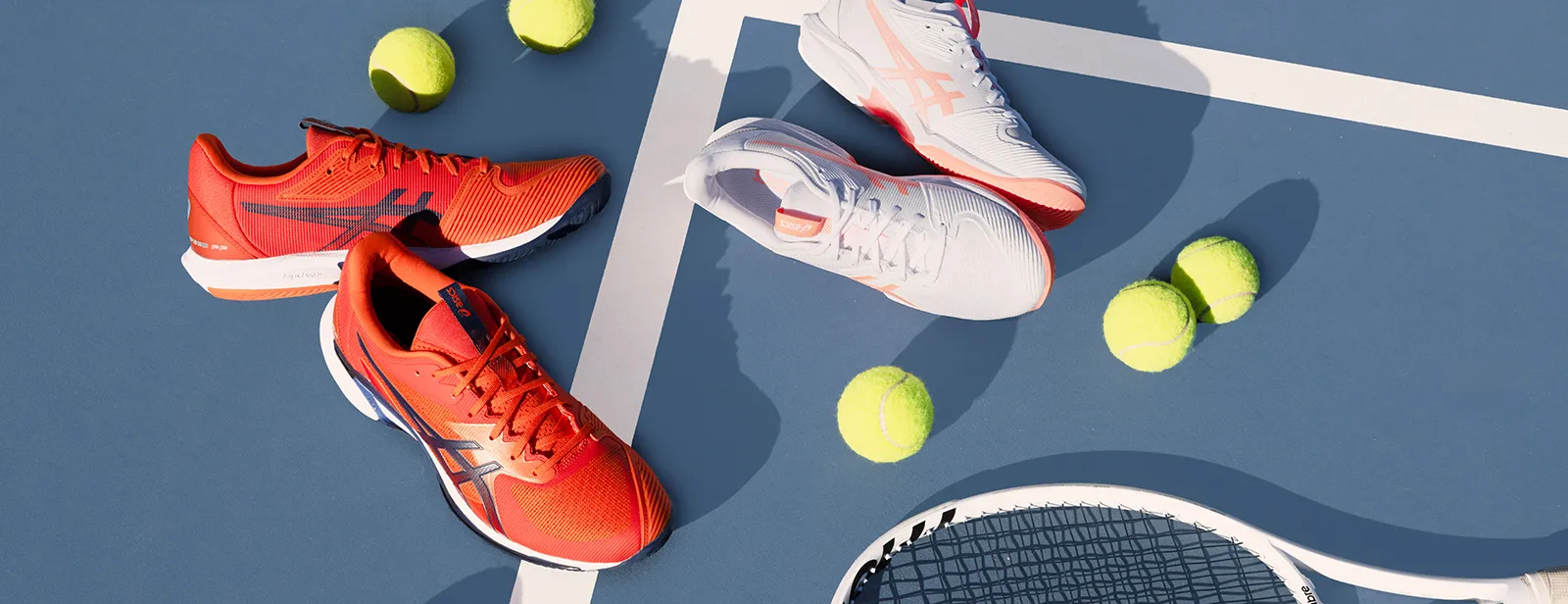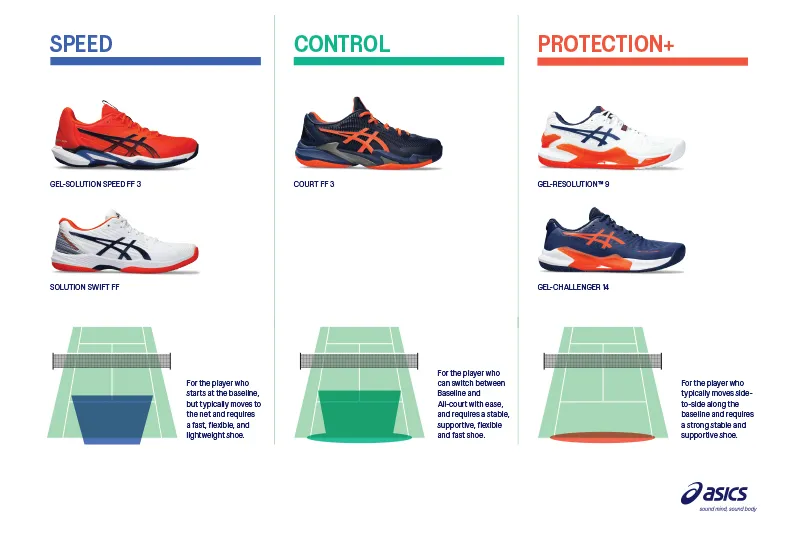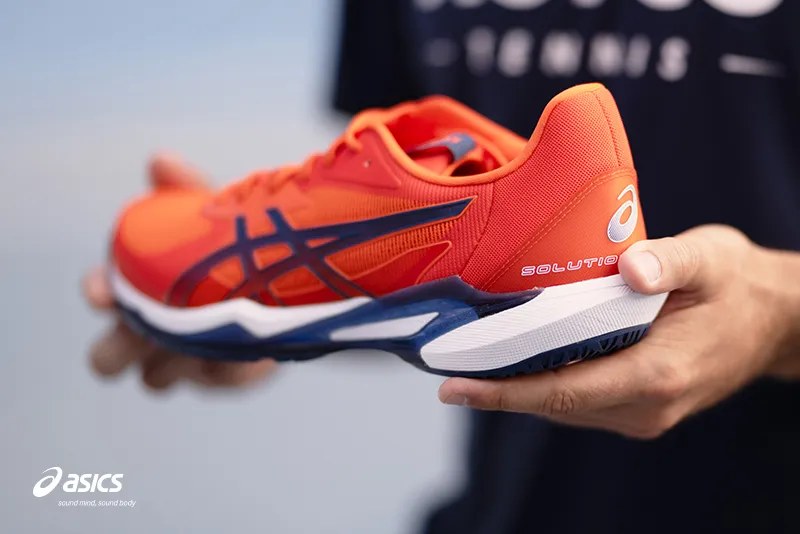
How to Choose Tennis Shoes
February 14, 2024
How to Choose Tennis Shoes
Wearing tennis shoes that fit your playing style can help improve your game and keep your feet healthy. Do you play the baseline, whole court, or have a serve-and-volley style? What court surfaces do you play on most often? Your answers to these questions are important, as they can help you determine which pair of tennis shoes will best meet your needs.
What makes a good tennis shoe?
With precise movements and high levels of impact across the court, tennis players can benefit from shoes that are functional, durable and well-cushioned. To achieve swift side-to-side movements, fast stops and lasting support, you’ll want to look for tennis shoes with these features:
- Lateral support. Tennis requires constant side-to-side motion during play and good tennis shoes would need higher levels of lateral support..
- Ground contact. Fast stops and explosive movements are a key part of any tennis player’s game. Tennis shoes need exceptional traction and are designed to place more sole in contact with the court.
- Durability. Tennis shoes are built to provide lasting support during long matches.
Consider the following factors when determining which tennis shoes to buy:
- Your playing style and level
- Type of court surfaceT
- Your desired fit

Types of tennis shoes based on playing style
Working with players and coaches at the ASICS Institute of Sport Science, our researchers create tennis shoes that meet the unique demands of different playing styles. These insights continue to influence how ASICS designs tennis shoes that help to be more comfortable and reliable.
“ASICS thinks about the movement of the player and knows exactly what I need to perform well,” said David Goffin, a Belgian tennis player.
1. Baseline player tennis shoes
Top benefit:
If you're a baseline player, you rely on explosive lateral moves, short sprints and fast stops to cover the court. Well-cushioned stability can help prevent injuries and transfer more energy into your baseline shots. Supportive tennis shoes with lateral stability are likely the most comfortable and efficient tennis shoes for the baseline-player style.
Best ASICS tennis shoes for baseline players
Advanced / athlete: GEL-RESOLUTION™
Intermediate: GEL-CHALLENGER™
Beginner: GEL-DEDICATE™
2. All-court player tennis shoes

Top benefit:
ASICS all-court player:
If you play from all sides and corner to corner, you could benefit from lightweight tennis shoes. Since all-court players tend to cover more ground during a match, this style can play better using a light, grippy shoe that enhances 360-degrees movement.
Best ASICS tennis shoes for all-court players
- Advanced / athlete: SOLUTION SPEEDTM FF
- Intermediate: SOLUTION SWIFTTM FF
- Beginner: GEL-GAMETM
3. Tennis shoes for best-of-both players
Top benefit:
Some players have the ability to change or mix their playing style depending on the opponent or court conditions. That said, blended-style players need a single pair of tennis shoes that support both playing styles.
Advanced / athlete: COURT FFTM
The different types of outsoles for tennis shoes
Tennis is played on multiple surfaces that can dramatically change what a player needs to be able to do. Tennis is a different game on clay courts and grass courts. On grass, the ball is lower and faster. On clay courts, the ball moves a little slower, but can bounce higher. That’s why it’s important to have tennis shoes that suit your preferred playing surface.

1. Hard court tennis shoes
In terms of ball bounce and speed, hard courts create playing conditions somewhere between those of grass and clay courts. When playing on hard courts, you’ll want supportive tennis shoes that also offer:
- A tough outsole. The highly abrasive surface demands a durable outsole.
- A tough upper. Having a tough upper can help provide stability when you’re moving around the court.
- Cushioning and bounce-back. Hard courts can be unforgiving on the feet and legs. Look for a shoe that absorbs as much of the impact as possible.
2. Clay court tennis shoes
With power, you can stand back and unleash huge shots, as well as sustain volleys from the back court. You’ll need stability and lateral support to align your stance and provide power for each shot. Good tennis shoes for clay courts have:
- Great grip. Clay courts generally don’t offer much traction, so your tennis shoe should provide as much grip as possible.
- Well-designed outsole. To assist with grip, outsoles need to easily release clay from grooves while not leaving marks on the court.
- Durable sides. Durable sides can help prevent damage as you slide for a ball.
- Lateral support. The combination of sliding and moving side-to-side along the baseline requires increased lateral support to promote stability.
- A tight upper. The advantages of a sole that grips and provides lateral support are delivered to the player through the upper’s contact with the foot. A tight upper lets the player take advantage of all of the shoe's design features.
- A tight upper. The advantages of a sole that grips and provides lateral support are delivered to the player through the upper’s contact with the foot. A tight upper lets the player take advantage of all of the shoe's design features.
3. Grass court tennis shoes
If you have a strong serve and can reach the net quickly, you’ll likely do well on grass, but you’ll still need a shoe that’s built for the occasion. Durable outsoles aren’t as important on grass courts because the softer surface isn’t very abrasive. Generally, tennis shoes for grass feature:
- Good grip. Grass courts may be slippery, so you should opt for shoes that offer a high amount of grip.
- Flatter outsoles. Tennis shoes with flatter outsoles can help prevent damage to grass courts.
- Flexible uppers. Flexible uppers can promote agility and help you make swift movements, which is important when playing on grass courts.
Please note: ASICS grass court-specific shoes are only available to ASICS ambassadors and are not available for purchase.
How should tennis shoes fit?
In order for your tennis shoes to help improve your performance and protect the health of your feet, you’ll want to make sure they fit correctly.
Tennis shoes should be snug but not tight. You want to feel secure as you move around the court, but keep in mind that you need some wiggle room at the toe to accommodate turning, pushing off, fast stops and dragging.
Picking the best ASICS tennis shoes for you
Through testing and research, ASICS has developed technologies and features that can help tennis players of all levels improve their game. Understanding your play style and court surfaces will help you determine the right ASICS tennis shoes for you.